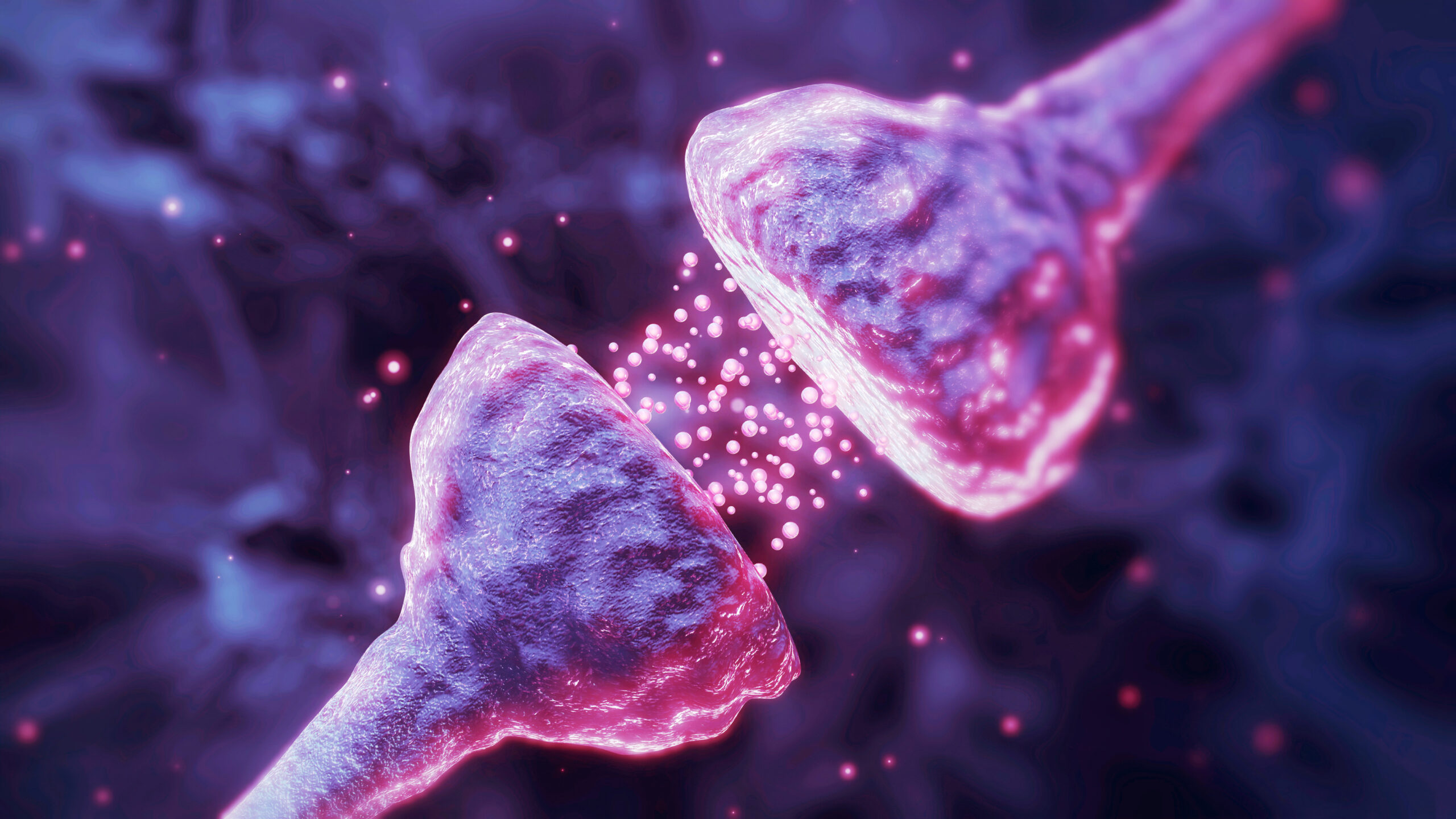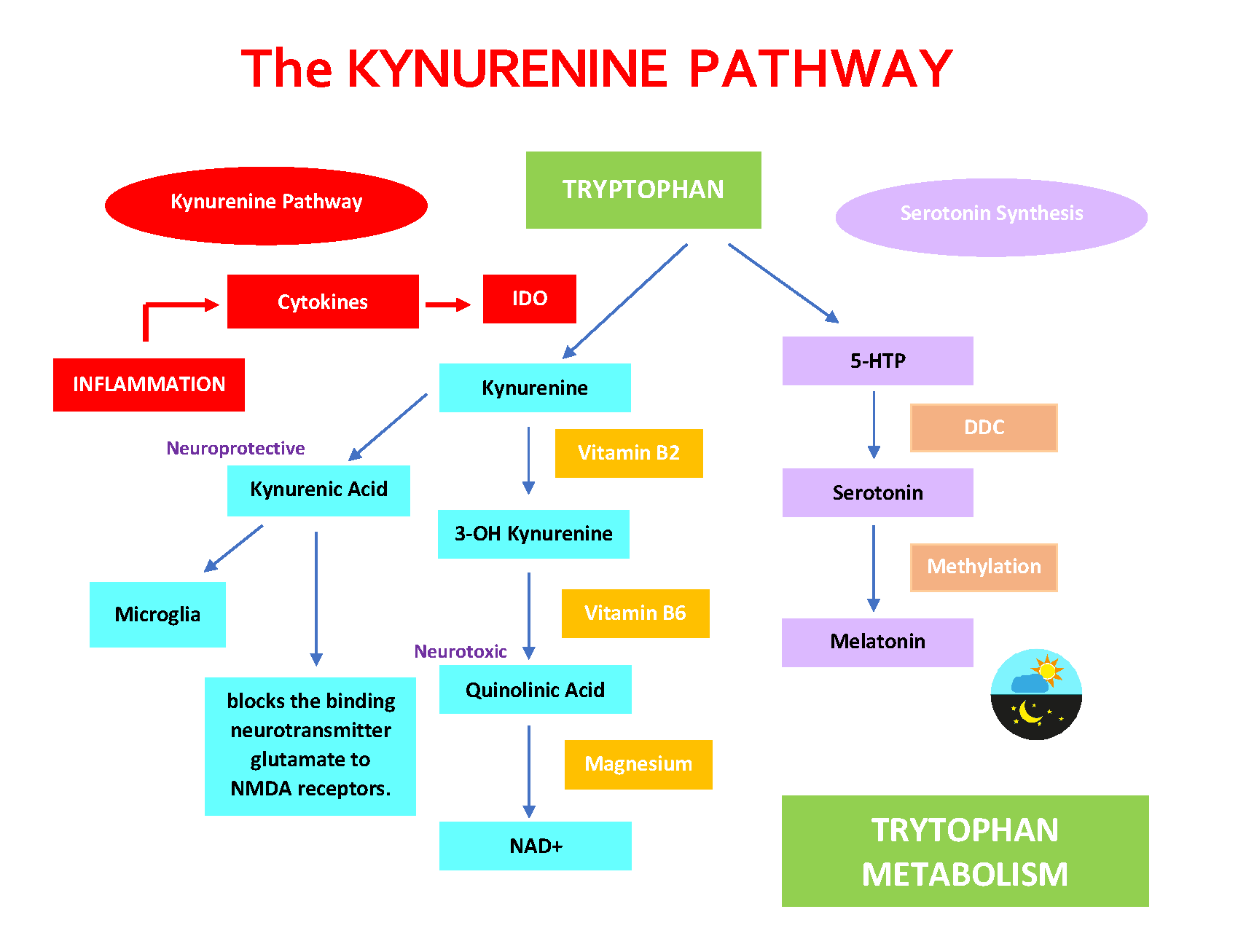Mental Health
Kynurenine Pathway Serotonin Synthesis Blood Test

Tryptophan & Serotonin Synthesis Blood Test
Tryptophan is an essential amino acid that plays a critical role in the synthesis of serotonin, a key neurotransmitter involved in regulating mood, sleep, appetite, and other physiological functions.
The synthesis of serotonin from tryptophan involves two main enzymatic steps:
- Conversion to 5-Hydroxytryptophan (5-HTP): The enzyme tryptophan hydroxylase catalyzes the hydroxylation of tryptophan to form 5-hydroxytryptophan (5-HTP). This is the rate-limiting step in the synthesis of serotonin. Tryptophan hydroxylase requires the cofactor tetrahydrobiopterin (BH4) and molecular oxygen to function.
- Conversion to Serotonin (5-Hydroxytryptamine, 5-HT): The enzyme aromatic L-amino acid decarboxylase (AADC), also known as DOPA decarboxylase, decarboxylates 5-HTP to produce serotonin. This step is relatively fast and not considered rate-limiting.
Importance of Serotonin
- Serotonin is crucial for various bodily functions, including:
- Mood Regulation: Serotonin is often referred to as the “feel-good” neurotransmitter because of its significant role in mood stabilization and the prevention of depression and anxiety.
- Sleep: Serotonin is a precursor to melatonin, a hormone that regulates sleep-wake cycles. Adequate serotonin levels are essential for healthy sleep patterns.
- Appetite Control: Serotonin helps regulate appetite and satiety, influencing eating behavior and weight management.
- Cognitive Functions: Serotonin affects various cognitive functions, including memory and learning.
- Gut Function: A large proportion of the body’s serotonin is found in the gastrointestinal tract, where it regulates intestinal movements and function.
- Factors Affecting Tryptophan Availability and Serotonin Synthesis
- Diet: Tryptophan is obtained from dietary sources such as poultry, eggs, dairy products, nuts, seeds, tofu, and legumes. Adequate dietary intake is essential for sufficient serotonin production.
- Transport Across the Blood-Brain Barrier: Tryptophan must cross the blood-brain barrier to be converted into serotonin in the brain. This transport is competitive with other large neutral amino acids, so the presence of these amino acids in the diet can influence tryptophan availability.
- Cofactors and Enzyme Activity: The activity of the enzymes tryptophan hydroxylase and AADC, as well as the availability of cofactors like BH4, vitamin B6, and iron, can affect serotonin synthesis.
- Clinical Relevance
- Mood Disorders: Low levels of serotonin are associated with mood disorders such as depression and anxiety. Selective serotonin reuptake inhibitors (SSRIs), a common class of antidepressants, work by increasing serotonin levels in the brain.
- Sleep Disorders: Disruptions in serotonin levels can affect sleep patterns and contribute to sleep disorders such as insomnia.
- Appetite and Weight Control: Serotonin plays a role in appetite regulation, and imbalances can lead to eating disorders and weight management issues.
In summary, tryptophan is vital for the synthesis of serotonin, which is essential for mood regulation, sleep, appetite, and various other physiological functions. Ensuring adequate tryptophan intake and supporting its metabolism can have significant implications for mental health and overall well-being.
6 Tryptophan Metabolites tested: Tryptophan, Kynurenine, Tryptophan/Kynurenine Ratio, 5-Hydroxytryptophan (5-HTP), Serotonin, Melatonin
Price: $199.00
Price includes convenient home collection kit for sample collection from the comfort of your home

The Kynurenine Pathway of Tryptophan and Serotonin Synthesis
The kynurenine pathway and serotonin synthesis both involve the metabolism of tryptophan, but they lead to the production of different metabolites with distinct physiological roles. Understanding the interplay between these pathways is crucial because it highlights how tryptophan availability is balanced between serotonin production and the generation of kynurenine and its metabolites.
Kynurenine Pathway:
The kynurenine pathway (KP) is the primary route for the catabolism of tryptophan, accounting for approximately 95% of tryptophan degradation. The key steps in the kynurenine pathway include:
- Conversion of Tryptophan to N-formylkynurenine:
- Enzymes Involved: Indoleamine 2,3-dioxygenase (IDO) and tryptophan 2,3-dioxygenase (TDO).
- Regulation: IDO is induced by pro-inflammatory cytokines (e.g., interferon-gamma), whereas TDO is regulated by stress hormones like cortisol.
- Conversion of N-formylkynurenine to Kynurenine:
- Enzyme Involved: Formamidase.
- Further Metabolism of Kynurenine:
- Conversion to Kynurenic Acid: Via kynurenine aminotransferase (KAT), leading to neuroprotective effects.
- Conversion to 3-Hydroxykynurenine: Via kynurenine 3-monooxygenase (KMO), leading to further conversion to quinolinic acid, which is neurotoxic and can generate NAD+.
Serotonin Synthesis:
Serotonin synthesis involves the following steps:
- Conversion of Tryptophan to 5-Hydroxytryptophan (5-HTP):
- Enzyme Involved: Tryptophan hydroxylase (TPH).
- Cofactors Required: Tetrahydrobiopterin (BH4), oxygen, and iron.
- Conversion of 5-HTP to Serotonin (5-HT):
- Enzyme Involved: Aromatic L-amino acid decarboxylase (AADC), also known as DOPA decarboxylase.
- Cofactors Required: Pyridoxal phosphate (vitamin B6).
Interplay Between the Kynurenine Pathway and Serotonin Synthesis:
- Tryptophan Availability: The balance between the kynurenine pathway and serotonin synthesis depends on the availability of tryptophan. Increased activity of the kynurenine pathway, often due to inflammation or stress, can reduce the availability of tryptophan for serotonin synthesis.
- IDO and TDO Activation: Activation of IDO and TDO diverts tryptophan away from serotonin synthesis towards the kynurenine pathway. This can result in decreased serotonin levels, which is often observed in conditions associated with chronic inflammation, such as depression, neurodegenerative diseases, and immune responses.
- Neuroactive Metabolites: The kynurenine pathway produces metabolites with neuroactive properties. For example:
- Kynurenic Acid: Neuroprotective, can antagonize excitatory neurotransmission.
- Quinolinic Acid: Neurotoxic, can contribute to neurodegeneration.
NAD+ Production: Quinolinic acid is a precursor for NAD+, essential for cellular energy metabolism and DNA repair.
- Serotonin and Immune Function: Serotonin itself can modulate immune function. Imbalances between the kynurenine pathway and serotonin synthesis can thus have broader implications for both neural and immune health.
- Clinical Implications:
- Mood Disorders: Increased kynurenine pathway activity and reduced serotonin synthesis are associated with mood disorders such as depression and anxiety. Therapeutic strategies might include targeting the kynurenine pathway or enhancing serotonin production.
- Neurodegenerative Diseases: Neurotoxic metabolites from the kynurenine pathway contribute to neurodegenerative diseases like Alzheimer’s and Parkinson’s. Modulating the balance between these pathways could provide neuroprotection.
- Chronic Inflammation: Conditions characterized by chronic inflammation often show a shift towards increased kynurenine pathway activity, which can deplete serotonin levels. Addressing the underlying inflammation can help restore balance.
Conclusion:
The kynurenine pathway and serotonin synthesis are two crucial metabolic routes for tryptophan, with significant implications for brain function, immune regulation, and overall health. The balance between these pathways determines the availability of tryptophan for serotonin production versus its conversion to kynurenine and its metabolites. Disruptions in this balance can lead to various health issues, highlighting the importance of understanding and potentially modulating these pathways for therapeutic purposes.
Test Details
Tryptophan is vital for the synthesis of serotonin, which is essential for mood regulation, sleep, appetite, and various other physiological functions. Ensuring adequate tryptophan intake and supporting its metabolism can have significant implications for mental health and overall well-being. This test measures the tryptophan metabolites involved in the synthesis of serotonin.
6 Analytes Tested:
- Tryptophan
- Kynurenine
- Tryptophan/Kynurenine Ratio
- 5-Hydroxytryptophan (5-HTP)
- Serotonin
- Melatonin
Tryptophan is an essential amino acid crucial for various physiological functions, impacting health, well-being, and longevity. Since the body cannot synthesize tryptophan, it must be obtained from dietary sources such as poultry, dairy products, nuts, seeds, and legumes.
Here are the key reasons why tryptophan is important:
- Precursor for Neurotransmitters and Hormones:
- Serotonin: Tryptophan is the precursor for serotonin, a neurotransmitter that regulates mood, sleep, appetite, and cognitive functions. Adequate serotonin levels are essential for mental health, and imbalances can lead to mood disorders such as depression and anxiety.
- Melatonin: Serotonin is further converted into melatonin, a hormone that regulates the sleep-wake cycle and has antioxidant properties. Proper melatonin levels are crucial for sleep quality, circadian rhythm regulation, and overall well-being.
- NAD+ Synthesis and Energy Metabolism:
- Kynurenine Pathway: Tryptophan is metabolized through the kynurenine pathway (KP), leading to the production of nicotinamide adenine dinucleotide (NAD+), a vital coenzyme in cellular energy metabolism. NAD+ is essential for ATP production, DNA repair, and the activation of sirtuins, proteins involved in aging and longevity.
- Immune Regulation:
- Modulation of Immune Responses: Metabolites from the kynurenine pathway, such as kynurenine and its derivatives, play roles in modulating immune responses and maintaining immune homeostasis. Proper regulation of these metabolites helps prevent chronic inflammation and autoimmune diseases.
- Cognitive Function and Neuroprotection:
- Neurotransmitter Balance: Tryptophan and its metabolites influence the balance of neurotransmitters, which are critical for cognitive functions such as memory, learning, and attention.
- Neuroprotection: Kynurenic acid, a metabolite of tryptophan, has neuroprotective properties that help protect neurons from excitotoxicity and oxidative stress, factors involved in neurodegenerative diseases.
- Gut Health:
- Microbiota Interaction: Tryptophan is metabolized by gut microbiota into bioactive compounds that influence gut health and systemic inflammation. A healthy gut microbiota composition is essential for overall health and can impact metabolic and immune functions.
- Protein Synthesis:
- Building Block of Proteins: As an amino acid, tryptophan is a fundamental building block of proteins. It is involved in the synthesis of various structural and functional proteins necessary for growth, repair, and maintenance of body tissues.
- Mental Health and Well-Being:
- Mood Regulation: Adequate tryptophan intake is essential for maintaining serotonin levels, which are crucial for mood stabilization. Low tryptophan levels can lead to mood disturbances and are associated with conditions such as depression.
- Stress Response: Tryptophan and its metabolites influence the body’s response to stress, helping to maintain mental resilience and overall psychological health.
Kynurenine is a crucial metabolite in the kynurenine pathway (KP) of tryptophan metabolism and plays an essential role in several physiological processes that impact health, disease, and longevity. The significance of kynurenine extends across multiple domains, including immune regulation, neuroprotection, energy metabolism, and mental health.
Key Roles and Importance of Kynurenine:
- Immune Regulation:
- Modulation of Immune Responses: Kynurenine has immunomodulatory properties that help regulate the immune system. It influences the balance between pro-inflammatory and anti-inflammatory responses, contributing to immune homeostasis.
- T-cell Regulation: Kynurenine induces the differentiation of regulatory T cells (Tregs), which help maintain immune tolerance and prevent autoimmune reactions. This is crucial for preventing chronic inflammation and autoimmune diseases.
- Neuroprotection:
- Neuroprotective Metabolites: Kynurenine is a precursor to kynurenic acid, a neuroprotective agent that acts as an antagonist at NMDA and alpha-7 nicotinic acetylcholine receptors. This helps protect neurons from excitotoxicity and oxidative stress.
- Balancing Neurotoxic Effects: Kynurenine pathway also produces quinolinic acid, a neurotoxic metabolite. The balance between neuroprotective kynurenic acid and neurotoxic quinolinic acid is critical for maintaining neuronal health and preventing neurodegenerative diseases.
- Energy Metabolism and NAD+ Synthesis:
- NAD+ Production: Kynurenine is involved in the synthesis of nicotinamide adenine dinucleotide (NAD+), a vital coenzyme in cellular energy metabolism. NAD+ is essential for processes such as glycolysis, the citric acid cycle, and oxidative phosphorylation.
- Cellular Repair and Longevity: NAD+ is also involved in DNA repair and the activation of sirtuins, proteins that regulate aging and longevity. Adequate levels of NAD+ are associated with improved mitochondrial function, reduced oxidative stress, and enhanced cellular repair mechanisms.
- Mental Health:
- Serotonin Balance: Kynurenine and its metabolites influence the availability of tryptophan for serotonin synthesis. An imbalance in the kynurenine pathway can affect serotonin levels, contributing to mood disorders such as depression and anxiety.
- Cognitive Function: Kynurenic acid, derived from kynurenine, has been shown to have neuroprotective effects that support cognitive function. Proper regulation of kynurenine metabolism is important for maintaining mental health and cognitive abilities, especially with aging.
- Oxidative Stress and Inflammation:
- Antioxidant Effects: Kynurenic acid has antioxidant properties that help mitigate oxidative stress, a major factor in aging and age-related diseases.
- Chronic Inflammation: By modulating immune responses and reducing pro-inflammatory cytokines, kynurenine helps prevent chronic inflammation, which is a hallmark of many chronic diseases and aging.
- Clinical and Therapeutic Implications:
- Biomarker for Diseases: Elevated levels of kynurenine and its metabolites are associated with various conditions, including cancer, neurodegenerative diseases, and psychiatric disorders. Measuring kynurenine levels can serve as a biomarker for diagnosing and monitoring these diseases.
The tryptophan/kynurenine (Trp/Kyn) ratio provides valuable insights into various aspects of our health, particularly related to immune function, inflammation, and overall metabolic status. This ratio reflects the balance between the availability of tryptophan and its conversion into kynurenine, mediated primarily by the enzyme indoleamine 2,3-dioxygenase (IDO), which is often activated during immune responses and inflammation.
Here’s what the Trp/Kyn ratio can tell us about our health:
- Immune Activation and Inflammation:
- Indication of Immune Response: A lower Trp/Kyn ratio typically indicates increased activity of IDO, which is upregulated in response to pro-inflammatory cytokines, such as interferon-gamma (IFN-γ). This suggests an active immune response, often seen in infections, autoimmune diseases, and chronic inflammatory conditions.
- Chronic Inflammation: Persistent low Trp/Kyn ratios are associated with chronic inflammatory diseases, including rheumatoid arthritis, inflammatory bowel disease, and systemic lupus erythematosus. This ratio can help monitor the extent and progression of inflammation in these conditions.
- Mental Health and Neurological Disorders:
- Depression and Anxiety: Tryptophan is a precursor to serotonin, a neurotransmitter involved in mood regulation. A lower Trp/Kyn ratio can indicate that less tryptophan is available for serotonin synthesis, potentially contributing to mood disorders such as depression and anxiety. Elevated kynurenine levels can also produce neuroactive metabolites that influence mood and cognitive function.
- Neurodegenerative Diseases: In conditions like Alzheimer’s disease, Parkinson’s disease, and multiple sclerosis, altered tryptophan metabolism and a reduced Trp/Kyn ratio may reflect underlying neuroinflammation and neurodegeneration.
- Cancer:
- Tumor Immune Evasion: Many tumors express high levels of IDO to evade the immune system by depleting tryptophan and producing immunosuppressive kynurenine metabolites. A lower Trp/Kyn ratio in cancer patients may indicate tumor-induced immunosuppression and can be associated with poorer prognosis.
- Infections:
- Acute and Chronic Infections: During infections, the body increases IDO activity as part of the immune response to limit pathogen growth by depleting tryptophan. A lower Trp/Kyn ratio during infection indicates active immune response and pathogen defense mechanisms.
- Metabolic and Systemic Health:
- Metabolic Disorders: Alterations in the Trp/Kyn ratio are linked to metabolic conditions such as obesity, diabetes, and cardiovascular diseases. Chronic low-grade inflammation in these conditions can lead to increased IDO activity and a lower Trp/Kyn ratio.
- General Health Status: The Trp/Kyn ratio can provide an overall snapshot of systemic health, reflecting the interplay between metabolism, immune function, and inflammation.
5-Hydroxytryptophan (5-HTP) is a naturally occurring amino acid and chemical precursor in the biosynthesis of serotonin, a crucial neurotransmitter that plays significant roles in regulating mood, sleep, appetite, and various other physiological functions.
The importance of 5-HTP lies in its role in serotonin production and its potential therapeutic benefits. Here’s why 5-HTP is important:
- Serotonin Synthesis:
- Direct Precursor: 5-HTP is the immediate precursor to serotonin (5-hydroxytryptamine or 5-HT). It is synthesized from the essential amino acid tryptophan through the action of the enzyme tryptophan hydroxylase. 5-HTP is then converted to serotonin by the enzyme aromatic L-amino acid decarboxylase (AADC).
- Bypassing Rate-Limiting Step: Since 5-HTP is downstream of the rate-limiting step (tryptophan to 5-HTP) in serotonin synthesis, supplementing with 5-HTP can effectively increase serotonin levels, potentially bypassing limitations in tryptophan hydroxylase activity.
- Mood Regulation:
- Antidepressant Effects: Serotonin is known for its mood-stabilizing effects. Low levels of serotonin are associated with depression and anxiety. By increasing serotonin levels, 5-HTP supplementation may help alleviate symptoms of depression and anxiety. Several studies have suggested that 5-HTP may be as effective as some antidepressant medications for improving mood.
- Anxiety Reduction: Higher serotonin levels can help reduce anxiety by promoting relaxation and improving emotional regulation.
- Sleep Improvement:
- Melatonin Production: Serotonin is a precursor to melatonin, the hormone that regulates the sleep-wake cycle. By boosting serotonin levels, 5-HTP can increase melatonin production, thereby improving sleep quality and helping with sleep disorders such as insomnia.
- Enhanced Sleep Patterns: Improved serotonin and melatonin levels contribute to better sleep patterns, which are essential for overall health and well-being.
- Appetite Control and Weight Management:
- Satiety and Appetite Regulation: Serotonin influences appetite and satiety. Higher serotonin levels can reduce food cravings and increase feelings of fullness, potentially aiding in weight management. 5-HTP supplementation has been shown to reduce food intake and promote weight loss in some studies.
- Reduction in Emotional Eating: By stabilizing mood and reducing anxiety, 5-HTP can help reduce emotional eating and cravings for carbohydrates, which are often associated with low serotonin levels.
- Pain Management:
- Fibromyalgia and Chronic Pain: Some studies have indicated that 5-HTP supplementation can help reduce pain and improve symptoms in conditions such as fibromyalgia. This is likely due to its role in increasing serotonin levels, which modulate pain perception.
- Migraine Prevention:
- Serotonin and Migraines: Low serotonin levels have been linked to the occurrence of migraines. 5-HTP supplementation may help prevent migraines by increasing serotonin levels and improving vascular tone.
- Improvement in Neurological Disorders:
- Parkinson’s Disease: In some cases, 5-HTP is used as an adjunct therapy for Parkinson’s disease to manage symptoms related to serotonin deficiency.
- Safety and Considerations:
- Potential Side Effects: While 5-HTP is generally well-tolerated, some individuals may experience side effects such as gastrointestinal issues, headache, or dizziness. It’s important to start with a low dose and gradually increase it under medical supervision.
- Interactions with Medications: 5-HTP should be used cautiously in combination with other serotonergic medications (e.g., SSRIs, MAOIs) due to the risk of serotonin syndrome, a potentially life-threatening condition caused by excessive serotonin levels.
- Supplement Quality: Ensuring the quality and purity of 5-HTP supplements is crucial, as contaminants can cause adverse effects.
Serotonin, also known as 5-hydroxytryptamine (5-HT), is a crucial neurotransmitter that plays a significant role in various physiological and psychological processes.
Its importance extends across multiple aspects of health and well-being, influencing mood, behavior, and bodily functions. Here are some key reasons why serotonin is important:
- Mood Regulation:
- Antidepressant Effects: Serotonin is often referred to as the “feel-good” neurotransmitter due to its significant role in mood stabilization and happiness. Low levels of serotonin are associated with mood disorders such as depression and anxiety. Many antidepressant medications, such as selective serotonin reuptake inhibitors (SSRIs), work by increasing serotonin levels in the brain.
- Anxiety Reduction: Adequate serotonin levels help regulate anxiety, reducing feelings of stress and promoting emotional stability.
- Sleep Regulation:
- Sleep-Wake Cycle: Serotonin is a precursor to melatonin, the hormone that regulates the sleep-wake cycle. Serotonin levels influence sleep patterns, and disruptions in serotonin lead to sleep disorders such as insomnia.
- Sleep Quality: Proper serotonin levels contribute to improved sleep quality, which is essential for overall health, cognitive function, and emotional well-being.
- Appetite and Digestion:
- Appetite Control: Serotonin plays a role in regulating appetite and satiety. It helps control food intake by promoting feelings of fullness and reducing food cravings, particularly for carbohydrates.
- Gut Function: The majority of the body’s serotonin is found in the gastrointestinal tract, where it regulates bowel movements and function. Serotonin is involved in the coordination of smooth muscle contractions, aiding in digestion and gut motility.
- Cognitive Functions:
- Memory and Learning: Serotonin impacts various cognitive functions, including memory, learning, and decision-making. Adequate serotonin levels support cognitive processes and overall brain health.
- Attention and Focus: Serotonin helps regulate attention and focus, contributing to better cognitive performance and mental clarity.
- Pain Modulation:
- Pain Perception: Serotonin modulates pain perception and is involved in the body’s response to pain. Low serotonin levels can increase pain sensitivity, while adequate levels help reduce the perception of pain.
- Chronic Pain Management: Conditions such as fibromyalgia and migraines are associated with serotonin dysfunction. Increasing serotonin levels can help manage chronic pain and improve symptoms.
- Cardiovascular Health:
- Vascular Tone: Serotonin influences the contraction and relaxation of blood vessels, playing a role in maintaining vascular tone and blood pressure. It helps regulate cardiovascular function and supports overall heart health.
- Platelet Function: Serotonin is stored in platelets and released during clot formation, playing a role in hemostasis and wound healing.
- Hormonal Balance:
- Reproductive Health: Serotonin interacts with various hormones and neurotransmitters, influencing reproductive health and menstrual cycle regulation. It affects hormonal balance and reproductive behaviors.
- Mental Health:
- Stress Response: Serotonin is involved in the body’s response to stress and helps regulate emotional reactions to stressful situations.
- Psychiatric Disorders: Dysregulation of serotonin is linked to several psychiatric disorders, including obsessive-compulsive disorder (OCD), schizophrenia, and bipolar disorder. Therapeutic strategies often aim to normalize serotonin levels to manage these conditions.
Melatonin is a hormone primarily produced by the pineal gland in the brain. It plays a crucial role in regulating sleep-wake cycles and maintaining circadian rhythms. Beyond its well-known role in sleep regulation, melatonin has various other physiological and potential therapeutic effects.
Here’s why melatonin is important:
- Regulation of Sleep-Wake Cycles:
- Circadian Rhythm: Melatonin is often referred to as the “sleep hormone” because it helps regulate the body’s internal clock, or circadian rhythm. Its production increases in the evening, promoting sleep, and decreases in the morning, promoting wakefulness.
- Sleep Quality: Adequate melatonin levels are essential for initiating and maintaining sleep. Supplementation with melatonin can help improve sleep quality, particularly in individuals with sleep disorders such as insomnia, jet lag, or shift work sleep disorder.
- Antioxidant Properties:
- Free Radical Scavenger: Melatonin has potent antioxidant properties. It neutralizes free radicals and reduces oxidative stress, protecting cells from damage. This is particularly important in protecting the brain, which is highly susceptible to oxidative damage.
- DNA Repair: Melatonin helps in the repair of damaged DNA and supports overall cellular health.
- Immune System Support:
- Immunomodulation: Melatonin modulates immune function and enhances the body’s defense mechanisms. It has been shown to have anti-inflammatory properties, which can help regulate immune responses and reduce chronic inflammation.
- Infection and Cancer: There is evidence to suggest that melatonin can improve outcomes in infections and may have potential anti-cancer properties due to its role in modulating immune responses and reducing oxidative stress.
- Neuroprotective Effects:
- Brain Health: Melatonin protects neurons from oxidative stress and has been shown to have neuroprotective effects. It is being studied for its potential role in preventing or slowing the progression of neurodegenerative diseases such as Alzheimer’s and Parkinson’s disease.
- Cognitive Function: By improving sleep quality and reducing oxidative stress, melatonin supports cognitive function and overall brain health.
- Mood Regulation:
- Seasonal Affective Disorder (SAD): Melatonin levels influence mood, and disturbances in melatonin production are associated with mood disorders such as seasonal affective disorder (SAD). Melatonin supplementation help regulate mood and alleviate symptoms of SAD.
- Depression and Anxiety: Some research suggests that melatonin may have a role in alleviating symptoms of depression and anxiety, likely due to its impact on sleep and circadian rhythms.
- Reproductive Health:
- Fertility and Menstrual Cycle: Melatonin influences reproductive hormones and plays a role in regulating menstrual cycles and fertility. It has antioxidant effects that support reproductive health.
- Pregnancy: Adequate melatonin levels are important during pregnancy for maintaining a healthy circadian rhythm, which affect both maternal and fetal health.
- Metabolic Health:
- Glucose Metabolism: Melatonin is involved in regulating glucose metabolism and insulin sensitivity. Disruptions in melatonin production impact metabolic health and are associated with an increased risk of conditions such as diabetes and obesity.
- Weight Management: Proper sleep regulation through melatonin influences appetite control and weight management.
- Cardiovascular Health:
- Blood Pressure Regulation: Melatonin helps regulate blood pressure by influencing the tone and function of blood vessels. It has been shown to have cardioprotective effects, including reducing the risk of hypertension and other cardiovascular diseases.
- SST tube of blood, serum
- saliva
7 – 10 days
Price For Test: $199.00
Please contact us at [email protected] for physician pricing

